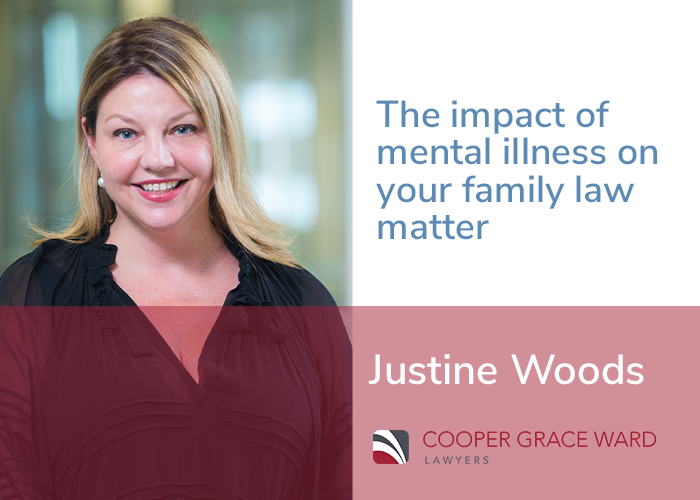In this video, CGW family law partner Justine Woods talks about the impact of mental illness on your family law matter.
Video transcript
Hello, hello, everyone. I’m Justine Woods. I’m the family law partner at Cooper Grace Ward and what we’re going to talk about today is the role of mental health in family law matters.
How does mental health impact family law matters?
Now, mental health is significant in family law matters, as in all others. Firstly, in relation to the issue of capacity and in simple terms, that means as a client you have to have the legal ability to give instructions to understand advice.
Now every state and territory in Australia has different but very similar laws about what the tests are, and it’s really the capacity to understand and process information and to make informed decisions to some extent about your own affairs. Now what it doesn’t mean is that you can’t be suffering from some kind of physical injury or have some diagnosed mental illness. In fact, I’ve had matters where my own client or the other side, and sometimes both had early onset dementia, for example, other forms of brain injury and with the support and assessment of their doctors, they were still found to have legal capacity. Because it’s not having perfect brain function or genius, it’s being able to understand information and decisions that are going to be significant in your own life. So, that’s the very dry aspect of mental health, if we can call it that, in that context, where people find it more worrying in a family law context and depending on whom I’m acting for, it’s either presented to me as a question about ‘I have depression, anxiety, bipolar, sometimes schizophrenia, various other diagnoses, I’ve been hospitalised. What will that mean for me and usually for my children?’
Now, ordinarily, and unless it’s at an unmanageable level, I’m able to reassure people immediately. Now I do exaggerate. I say half of Australia has these issues. Don’t worry about it. If you are compliant with your treatment program, if you regularly see your doctor, take your medication, have therapy and other interventions that have been recommended to you, it is not going to be what I call disentitling conduct or occurrences in your family law matter. Now of course, terribly flagrant mental ill health that endangers children or places them at an unacceptable risk of danger or the other party can be a trigger for time, or unsupervised time, not being allowed between, for example, a parent and and children. But it has to be at a fairly high level and it has to be something that can’t be managed with, for example, say the presence of a third party like a kindly grandmother or grandfather to assist that kind of thing. So, ordinarily it’s not disentitling conduct.
It will sometimes feature in affidavits and certain styles of practitioners. And if people act for themselves, they allow a lot of irrelevant and highly inflammatory material to come in. I mean, I’ve read affidavits prepared by parties or certain solicitors where they describe the mental ill health of the former spouse from their teenage years. How is that relevant? How is that relevant in when the court’s trying to make a decision about the best interests of the children in the present moment? Some history is, of course, pertinent, but not trawling through years and years of it if it’s not still a very compelling issue now. So, that might be of comfort to you.
Can mental health issues stop me or my ex from seeing the children?
Now, on the other side, I do have people often presenting with what they think is the crucial piece of evidence that my ex-spouse has done this or suffered this or is in hospital. That must be the end of the story, mustn’t it, in terms of their interaction with the children? And I have to say to them, no. And for the corollary of the reasons that I’ve just described, that unless it can’t be managed, unless they’re not compliant with the program or they don’t have what are I suppose congruent views. There’s for example, a recent case where a father who was found by the family report writer to have a warm and loving relationship with his children, had started the matter, saying that his participation in an activity where that had a sexual element, where you wear babies clothes and are treated like an infant, that that was just a lifestyle choice and didn’t need any intervention. By the time it came to trial, it had expanded into that was his business as well and he was producing the clothes for others to buy and running a business and a website full time about this type of activity. And the judge ultimately found that that conduct, which on one of the expert’s assessments, was a form of mental illness, borderline personality disorder, and some and some other features was going to be a concern for the children, and they were placed at an unacceptable risk by being exposed to that lifestyle. So, again, now that’s a rather extreme and unusual example.
So, as we say, always in law, it depends. But for the most part, mental health, as we know, is a feature of modern life and it’s failures in some respects and people’s fragilities. That’s something the Family Court sees regularly and provided people are doing what their doctors expect of them and that they can moderate their behaviour to the extent that the children are not being exposed to an unacceptable risk of harm, then it isn’t going to be a critical factor in a parenting matter.
How do mental health issues impact on financial matters?
Now it’s also relevant in financial matters because one of the critical steps when a party’s entitlements to a property settlement being are examined is firstly their – and these are the steps following determining whether a property settlement is required or not and that can be a very big step in some cases. Then what is the asset pool now? What were each person’s contributions starting from the beginning of the relationship? And what are their future needs? Now, age, state of health are very important factors in both married and de facto property settlements in terms of future earning capacity. So if, for example, one party has a diagnosed serious mental illness that has been found by an acceptable, respectable expert to mean that they cannot work, that it is likely to give an adjustment or can only reduce, work reduced hours, for example, that might result in a percentage adjustment in favour of that person. It can also result in spousal maintenance being paid.
Now, depending on age, spousal maintenance is generally (now, these are very rough rules and may not apply in every case) it’s payable by a person with financial capacity to the other spouse who, for some acceptable reason under the family law act, is unable to support themselves. One of those reasons is ill health, mental, physical, and it requires evidence. Now, depending on age and the severity, that standard sort of spousal maintenance order is between three and five years. And sometimes it doesn’t arise because of ill health at all. It might be because children are young. There have been joint decisions made during the marriage. To have one person at home they need to reenter the workforce. So, it depends on what facts the decision is being made. But there are some cases where older people for example, who are incapable of work for an acceptable medical reason, are ordered to receive indefinite spousal maintenance or maintenance until they reach a retirement clause under their superannuation benefits, for example.
Should I be concerned?
So, if I summarise really the position of mental health, it’s going to be relevant in your family law matter for your children and also for potentially the financial impact. Don’t be frightened. Don’t be overly anxious about it. If you are managing it or it can be managed, it will be within the system. It is not disentitling conduct.
I do say, however, to people and I made this rule up, but it’s the rule of three. So, for example, I’ve had more than one client over the last 27 years of practicing who had two issues. Maybe it was alcohol. Maybe it was, you know, severe mental health periods of hospitalisation, things like that. I get that can be managed. You will still see your children. You’ll still be an important and perhaps the primary carer of the children. What you can’t have is a third issue. And I’ve had cases where that was sometimes them taking illegal drugs. Right, so that triggers the other side. It will certainly trigger the court or, for example, taking up with a violent partner or one who’s had even a history of pedophilia I’ve had in one case. So, if you have something on top of your other issues, be careful, because really one is manageable. Two, slightly more challenging, but still manageable if you’ve got three florid areas of concern, you will have a more difficult run. Now, sometimes it’s unavoidable, but it’s something to bear in mind when you’re considering separation, when you’re approaching your family law matter.
And if you’d like to talk about any of these issues, you’re very welcome to contact us here at Cooper Grace Ward.





